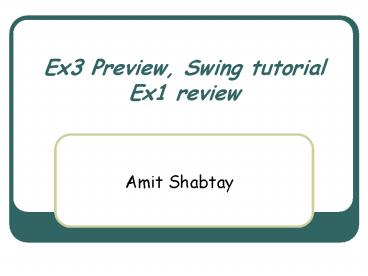Ex3 Preview, Swing tutorial Ex1 review - PowerPoint PPT Presentation
1 / 25
Title:
Ex3 Preview, Swing tutorial Ex1 review
Description:
Swing gives an overview on AWT and Swing and checks the pros and cons of each. In general, Swing has a better design with massive use of design patterns, look ... – PowerPoint PPT presentation
Number of Views:37
Avg rating:3.0/5.0
Title: Ex3 Preview, Swing tutorial Ex1 review
1
Ex3 Preview, Swing tutorialEx1 review
- Amit Shabtay
2
Next Exercise- ex3- xmli
- In Ex3 you will build XML interpreter.
- This interpreter will receive an xml file. Simple
commands will be accepted by the interpreter and
will form HTML output. - For the ex you will use your xmlp code.
- You will create a simple GUI for the xmli.
3
Ex3- GUI
Output Area
Enter Command
Send
HTML 1
HTML 2
HTML 3
HTML 4
4
Ex3- an XML input file
- ltBook id "123" status "available"gt
ltNamegtRefactoringlt/Namegt ltAuthorgt
ltFirstNamegtMartinlt/FirstNamegt
ltLastNamegtFowlerlt/LastNamegt lt!-- Here's
an example of a list within a list --gt
ltOtherBooksgt ltBookNamegtUML
Distilledlt/BookNamegt
ltBookNamegtAnalysis Patternslt/BookNamegt
lt/OtherBooksgt lt/Authorgtlt/Bookgt
5
Ex3- Commands
- edit output-name
- Selects the current view to be modified.The
default is view 1. - Example edit 2output Now editing view 2
- select tag-name
- Selects all tags tag-name and all their
parents.Example select BookNameoutput
Selected 5 tags (BookName2,
OtherBooks, Author, Book) - Acts only on the view we are currently editing!
6
Ex3- Commands
- upcase tag-name
- Will change all tags with tag-name to upper
case. Example upcase BookNameoutput
Modified views view2 - Acts on ALL the view we are editing!
- (views that were selected and have this tag)
- locase tag-name
- The same, but to lower case.
7
Ex3- Commands
- Undo
- Undoes the last command.
- Can be called several times.
- Example undooutput Modified views view2
(This is in the case that the last command was
upcase or locase) - Exiting is by using the X of the window.
8
Swing Tutorial
9
AWT- Abstract Window Toolkit
- In 1995, Java technology introduced to the World
Wide Web developers a network-centric,
object-oriented language that provided client
side processing for otherwise static pages. - Java platform's graphical user interface library,
the Abstract Window Toolkit (AWT), is used in the
creation of dynamic Web pages and is a
multiplatform tool.
10
JFC- Java Foundation Classes
- Java Foundation Classes extends the original AWT
by adding a comprehensive set of graphical user
interface class libraries that is completely
portable and delivered as part of the Java
platform - JFC is composed of the AWT, Swing and Java2D.
11
SWT- Standard Widget Toolkit
- AWT was buggy beyond belief this was just poor
code that needed fixing by Suns coders. At IBM
we hated Swing from day one. Big, buggy, and
looks crap. (Simon Ritchie) - SWT is a widget toolkit for Java designed to
provide efficient, portable access to the
user-interface facilities of the operating
systems on which it is implemented.
12
AWT vs. Swing
- AWT vs. Swing gives an overview on AWT and Swing
and checks the pros and cons of each. - In general, Swing has a better design with
massive use of design patterns, look and feel
options, event handling.
13
Swing vs. SWT
- Great debate.
- Pro Swing (logemann) Coding is easier to
learn Better API Swing is a standard - SWT uses native code for each platform, so it is
faster and has better Look Feel. (Eclipse is
an Example for SWT instance)
14
Ex1 review
15
Ex1 Goals
- Our goal in this ex was to
- Practice in building a scalable designusing
common language- design patterns.(Structural
and Traversal) - Practice with UML, Ant
- Create a habit of testing the code.
16
Ex1 Review- Design By Contract
- API and comments are most important.
- Design documentation is not only for the grader
but also serves as a contract with the package
user.
17
Ex1 Review- Trivialities
- These are not acceptable
- String s Tryif (s Try)
System.out.println(Wow) - Tag x new Tagvisitor.visit((Tag)x)
18
Ex1 Review- Good Separation
- Your exercises design in general was good
Data Structure
Reader
Writer
Reader Implementation
Building Blocks
Writer Implementation
19
Ex1 Review- DataBase or Mediator
- What about
- VS.
Data Structure
Reader
Writer
Mediator on the fly
Reader
Writer
20
Ex1 Review-Nearly Empty Class
- class Attribute String key String
value
21
Ex1 Review- Data Structure
- Most used Element, CompositeElement and deriving
Tag, Comment, . - Interesting case
CompositeElement
Tag
IElement
Element
Comment
Text
int depth
22
Ex1 Review- Interfaces use
Element
IElement
Comment
Text
Attribute
IComment
IText
IAttr
23
Ex1 Review-Interfaces methods
- abstract class Element
- public Iterator getSons()
- return null
- public void addSon(Element e)
- return
- //This visitor method is wrong, because it
should be an //empty implementation - abstract public void visit(Element e)
This can be avoided using a visitor, though the
comosite design pattern specifies this design.
24
Ex1 Review-Traversal
- Three examples
- While (iterator.hasNext()) Element x
iterator.next() x.accept(visitor)//For each
element, use i.next() - X.accept(visitor)//Traverse using only the
visitor - Traverse elements using visitor, but children of
an element using an iterator
25
Ex1 Review-Filtering
- Now it is your turn Possible ways for
filtering (comments and attributes)































